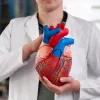How is a Heart Attack Diagnosed?
A heart attack, also known as a myocardial infarction, occurs when the blood flow to the heart muscle is blocked, resulting in damage to the heart. It is a serious medical condition that requires immediate attention. Diagnosing a heart attack involves a combination of medical history, physical examination, and various tests. In this article, we will explore the diagnostic methods used to identify a heart attack and understand the importance of early detection.
Medical History and Physical Examination
When a person experiences symptoms that could indicate a heart attack, the first step in the diagnostic process is a thorough medical history and physical examination. The doctor will ask questions about the symptoms, previous medical conditions, and family history of heart disease. They will also perform a physical examination to check for any signs of a heart attack, such as abnormal heart sounds or irregularities in the pulse.
Electrocardiogram (ECG)
One of the most common tests used to diagnose a heart attack is an electrocardiogram (ECG). This non-invasive test measures the electrical activity of the heart and can detect any abnormalities. During an ECG, electrodes are placed on the chest, arms, and legs, which record the electrical signals from the heart. Changes in the ECG patterns can indicate if a person has had a heart attack or is at risk of having one.
Blood Tests
Blood tests are essential in diagnosing a heart attack. These tests measure certain substances in the blood that are released when the heart muscle is damaged. The two primary blood tests used to diagnose a heart attack are:
- Troponin Test: Troponin is a protein released into the bloodstream when the heart muscle is injured. High levels of troponin in the blood can indicate a heart attack.
- Creatine Kinase (CK) Test: CK is an enzyme found in the heart muscle and other tissues. Elevated levels of CK in the blood can suggest a heart attack.
The combination of ECG and blood tests helps healthcare professionals confirm the diagnosis of a heart attack and determine its severity.
Imaging Tests
Several imaging tests may be performed to further assess the extent of the heart damage caused by a heart attack. These tests include:
- Echocardiogram: This test uses sound waves to create images of the heart’s structure and function. It can help identify areas of the heart that have been damaged.
- Cardiac MRI: A cardiac MRI provides detailed images of the heart using magnetic fields and radio waves. It can help determine the size and location of the damaged areas.
- Coronary Angiography: This invasive procedure involves injecting a dye into the coronary arteries to visualize any blockages or narrowing. It helps identify the underlying cause of the heart attack.
Importance of Early Detection
Detecting a heart attack early is crucial for the best possible outcome. Rapid diagnosis allows medical professionals to provide timely treatment, which can help minimize heart damage and save lives. It is essential to recognize the symptoms of a heart attack, such as chest pain or discomfort, shortness of breath, nausea, and cold sweats, and seek immediate medical attention.
Introducing Fitpaa: Your Partner in Health and Fitness
At Fitpaa, we understand the importance of taking care of your heart and overall health. Our mission is to help individuals achieve their health and fitness goals through personalized and effective solutions. With our AI-driven Metabolism monitoring and management technology, we provide a comprehensive approach to optimizing your overall well-being.
Fitpaa offers a three-step process to help you achieve your health and fitness goals:
- Metabolism Assessment: Our MNT (Medical Nutrition Therapy) specialists use the latest technology to assess your current metabolism, identifying the root cause of your health condition.
- Fitpaa Capsule: Based on your metabolism, health goals, lifestyle, and eating habits, our expert team of fitness coaches, nutritionists, and doctors create a personalized Fitpaa Capsule. This all-in-one solution includes medical therapy, exercise therapy, nutrition therapy, and cognitive behavior therapy to optimize your metabolism and support your journey towards better health.
- Fitpaa App and Real-time Guidance: Our user-friendly mobile app provides you with all the necessary tools to follow your Fitpaa Capsule effectively. With features like a virtual workout trainer, diet tracker, performance tracking, and progress tracking, staying on track becomes effortless. Additionally, our real-time guidance technology incorporates habit-building concepts and timely nudging to keep you motivated and inspired throughout the day.
By combining the expertise of our health and fitness team with cutting-edge technology, Fitpaa delivers guaranteed results and ensures your journey towards optimal health is enjoyable and sustainable. We are proud to have transformed the lives of thousands of individuals and are passionate about helping you achieve your health and fitness goals.
To experience the joy of a healthier, fitter life, download the Fitpaa app today and begin your transformative journey. Your well-being is our mission, and we are here to support you every step of the way. Don’t wait – start achieving your health and fitness goals with Fitpaa!









